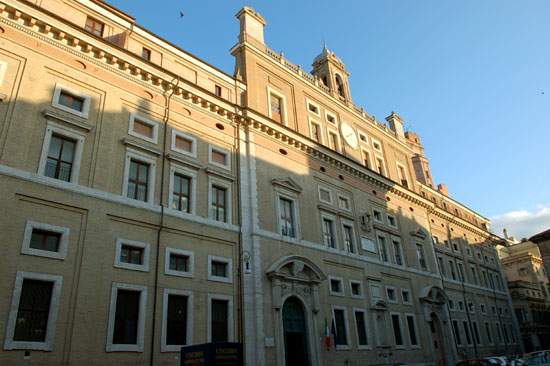Even the Higher Council of Cultural Heritage was perplexed about the Bonisoli reform. And called for rapid hiring
On the MiBAC website has been published the opinion that the Higher Council for Cultural and Landscape Heritage had issued last July 24 on the Bonisoli reform, which was then awaiting publication in the Official Gazette but had already been approved by the government (as is well known, in fact, the DPCM containing the reform of the Ministry of Cultural Heritage and Activities was approved last June 19). The Council was mainly speaking about the main new features, without sparing some veiled criticisms.
Beginning with the new General Directorate “Contracts and Concessions”: the Council noted that “this is a structure that will be able to reduce the dependence of the Ministry’s offices on external central purchasing bodies, and their very high costs, and that, at the same time, will be able to provide guidelines to the peripheral structures, which will continue to be contracting stations for the tenders pertaining to them,” but it also stressed that it will be essential to “accurately establish the thresholds of value of the tenders managed by the Directorate and those pertaining to the peripheral structures, leaving the latter adequate spheres of action.” Again, the Board noted that in order to give life to the new Directorate General, however, “appropriate and timely selections of personnel with knowledge of public contracting applied to the Ministry’s functions” will be necessary, and it will be necessary to delineate precisely “the relations between the new Central Directorate and the Budget and Organization Directorates.”
The Board then appreciated the confirmation of the single superintendencies, which were retained “because of their importance from the standpoint of administrative simplification and interdisciplinary vision”: the Board acknowledged that the “role of individual specialized skills was, at the same time, enhanced with a modality regarding the decision-making process: the person in charge of the procedure for the adoption of acts of consent, authorizations, opinions, visas or clearances is necessarily the official responsible for the subject matter (e.g.: archaeological heritage, architectural heritage, landscape); the single Superintendent cannot deviate from the findings of the investigation conducted by the person responsible for the subject matter unless he indicates the reasons in the final measure; in this case, the Superintendent is required to inform the General Directorate of Archaeology, Fine Arts and Landscape.” This mechanism appeared to the Council to be suitable for simplification and to leave the peripheral offices their decision-making autonomy while activating an information flow at the central level to monitor “the reasons and lentitude of any conflicts or inconsistencies at the local decision-making level.”
Criticism, on the other hand, for the centralist logic that assigns decisions on constraints to the Director General of Archaeology, Fine Arts and Landscape: “there is a need,” the Council wrote, “for a homogeneity of decisions on constraints, which is essential for the protection of cultural heritage” (although it was pointed out that the power of proposal still remains with the Superintendent and the final decision is taken by the Director General, while previously it was the Regional Cultural Heritage Commissions that decided). “It would be opportune,” the Council again noted, “for the Directorate General to consolidate the preparation of guidelines addressed to the Superintendencies: which could limit the cases of discrepancies between the proposal of the Superintendencies and the final decision of the Directorate, mitigating the risks of delays in the bonding procedures.”
The Council also frowned upon the excessive attribution of powers to the figure of the Secretary General: “Possible critical issues, in terms of excessive centralization, arising from such a combination of powers, which is not always well delineated by the rules, were pointed out. It should be pointed out that in every Ministry organized as a General Secretariat, the Secretary is a key-figure not exclusively endowed with coordinating powers. However, since the Ministry of Cultural Heritage has traditionally been characterized by specific technical expertise and a highly decentralized design that should ensure its effective action on the ground, it would be appropriate that the coordinating functions of the Secretary General should definitely prevail over the others. For example, the inspection functions should be revised.” And again, the Council stressed, “the technical and strategic expertise in the digitization of cultural heritage already gained in this field by the sectoral directorates-general and institutes such as ICCU, ICCD and ICAR should be absolutely safeguarded.”
As for the district secretariats, the Council suggested “rational criteria” for their modulation, while stressing the fact that since they would no longer have to depend on the Budget Directorate but on the Secretary-General, their coordination task would be more incisive. The same appeal to rationality and objectivity was made to the ministry and the government for the abolition of the autonomy of some museums, the regulation of the functions of directors and the possible abolition of the boards of directors: “it is essential,” the opinion again reads, “that any decision in this regard be preceded by an adequate assessment of the actual functioning of these bodies in the different realities. There is nothing to prevent that, by provision of the statutes, there are different governance structures in different museums. There should also be clear criteria on the mechanisms for appointing members of scientific committees and museum boards.”
Regarding the definition of the new territorial directorates of the museum networks, the Council hoped that “when redefining the structure of the networks, adequate consideration should be given to the number of sites to be managed, the geographical conformation of the territory and its specificities. Where supra-regional amalgamation is carried out, it will be appropriate that the Director be assigned only coordination functions and that the concrete management of the sites be delegated as much as possible to the delegated officials in charge of the individual sites. It is also necessary to define the situation of public libraries currently attached to museum poles.”
Finally, crucial node of the ministry’s future, according to the Council, are personnel problems: “no organizational reform can disregard balanced solutions in the area of labor relations and conditions.” For this reason, the Council believed that it is “essential to quickly follow up on the announced recruitment plan, starting with the 2019-2020 biennium, always giving priority to permanent relationships.” The staffing problem also concerns its balance: “it is essential to ensure a better balance in the distribution of staff between central and peripheral structures, also as a result of the new recruitments: the decentralized offices of the Ministry should not be depleted of professional and economic resources. It remains essential to establish criteria for the periodic rotation of managers and, in this sense, the provision introduced by the D.P.C.M. regarding the possibility of renewing the Superintendent’s post for one time only appears important.”
Ultimately, the Council believed that “in the implementation of the reform of the Ministry, simplification should be of great importance, to avoid overlapping of functions and excessive interference of the central administration in the technical and scientific competences of the peripheral structures. Going forward, it is necessary to rationalize peripheral, intermediate and central competencies in order to build a valid interlocution with the regions and local authorities, also in light of differentiated regional autonomy programs.” And on this last point, the Council reserved the right to take action.
In the photo: the Collegio Romano, headquarters of MiBAC
 |
| Even the Higher Council of Cultural Heritage was perplexed about the Bonisoli reform. And called for rapid hiring |
Warning: the translation into English of the original Italian article was created using automatic tools. We undertake to review all articles, but we do not guarantee the total absence of inaccuracies in the translation due to the program. You can find the original by clicking on the ITA button. If you find any mistake,please contact us.



























